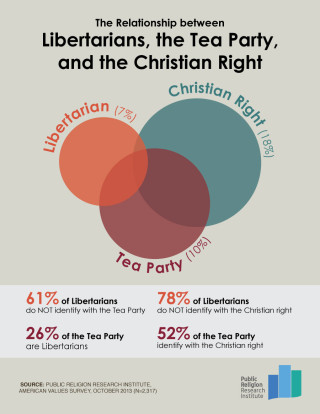 In 2010, PRRI’s inaugural American Values Survey uncovered an important relationship between the Tea Party movement and the Christian right—roughly half of those who identified as members of the Tea Party also said they were part of the conservative religious coalition. Three years later, the 2013 American Values Survey profiles libertarians as an increasingly relevant conservative group and explores their relationship to existing conservative constituencies.
In 2010, PRRI’s inaugural American Values Survey uncovered an important relationship between the Tea Party movement and the Christian right—roughly half of those who identified as members of the Tea Party also said they were part of the conservative religious coalition. Three years later, the 2013 American Values Survey profiles libertarians as an increasingly relevant conservative group and explores their relationship to existing conservative constituencies.
Although some prominent Tea Party leaders claim the movement is primarily based in libertarian values, the two groups are largely independent of each other. More than 6-in-10 (61 percent) libertarians say they do not consider themselves part of the Tea Party movement. And on the whole, Tea Party members are not libertarians. In fact, libertarians constitute a smaller proportion of the Tea Party movement than other core conservative groups. About one-quarter (26 percent) of Americans who identify with the Tea Party movement are libertarians. Twice as many Americans who identify with the Tea Party (52 percent) say they are a part of the religious right or conservative Christian movement. In contrast, only 22 percent of libertarians identify as part of the Christian right movement.
Overall, libertarians and members of the Tea Party are roughly equal in size, making up seven percent and 10 percent of the adult population respectively. Roughly 1-in-5 (18 percent) Americans report that they are part of the religious right or conservative Christian movement.




